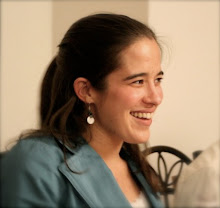After two missed flights and two re-bought flights in the past week and a half, two flight delays and reschedulings of connecting flights, some stress-filled and near-tears unloading of my frustrations on my family and boyfriend, and several hours of lines for check-in and security, I arrived in Ecuador at 8 am the morning of Easter Sunday and to Quito, my pick-up point, around 11:00 am. Guided by a sign with my name on it, I met up with a driver arranged by HCJB (the missions organization who run the hospital) who drove me to one of the missionary docs and his family, who then drove me to with them back to Shell.
The drive through the Andes down to the edge of the Amazon basin was gorgeous with beautiful peaks and crevices, many small waterfalls and streams from the heavy recent rains, and green, green, green. It was interesting watching the vegetations change from tall coniferous-looking trees to the jungle-like ones with a patch of leaves a top a bare trunk, palm-looking trees, and giant ferns. Random bits of color in bright flowers were scattered throughout both types of foliage.
A brief introduction awaited me on my arrival in Shell, including a tour of the hospital and a showing of where I obtain clean filtered water. The hospital is certainly the best-equipped mission hospital where I have worked, at least in the sense of Western medicine. It is divided into consulta externa (outpatient clinic), the inpatient hospital, and emergency (three emergency rooms with OR-like lights, suture kits, specula, neb machines, etc.). There are ventilators, including for children (although most [all?] are old), and incubators. I can order cultures and electrolytes, luxuries I didn't have at the hospital I rotated at in Zambia in medical school (see the beginning of this blog for some of those stories).
It's an interesting mix of what I'm used to from previous experiences overseas and things that are more like the States. Send-out labs to Quito (including uncommon things like a CA 19-9 tumor marker and common things like a TSH) take 1-2 weeks to come back. I wash my dishes with the half-solid soap I used in Honduras, but I've dirtied more than one glass forgetting that I can't drink from the tap. I drink water I've boiled from the tap or gotten from the special treated tap, and I treat all vegetables/fruit in a special solution to kill the germs, but I ate pizza tonight at a restaurant with the other residents and I have 24-hour electricity and warm water in which to shower. So it's an adjustment, and certainly trying to do medicine all in Spanish is probably the biggest adjustment overall, but in many ways it is not as much of an adjustment as I expected. I'm working on a post with some patient stories, so look for that in the next few days, but it likely won't be tomorrow since I'm on call.
The drive through the Andes down to the edge of the Amazon basin was gorgeous with beautiful peaks and crevices, many small waterfalls and streams from the heavy recent rains, and green, green, green. It was interesting watching the vegetations change from tall coniferous-looking trees to the jungle-like ones with a patch of leaves a top a bare trunk, palm-looking trees, and giant ferns. Random bits of color in bright flowers were scattered throughout both types of foliage.
(not mine b/c I lost my camera in my bag - only to find it later - but the ride to Shell did look very similar to this)
A brief introduction awaited me on my arrival in Shell, including a tour of the hospital and a showing of where I obtain clean filtered water. The hospital is certainly the best-equipped mission hospital where I have worked, at least in the sense of Western medicine. It is divided into consulta externa (outpatient clinic), the inpatient hospital, and emergency (three emergency rooms with OR-like lights, suture kits, specula, neb machines, etc.). There are ventilators, including for children (although most [all?] are old), and incubators. I can order cultures and electrolytes, luxuries I didn't have at the hospital I rotated at in Zambia in medical school (see the beginning of this blog for some of those stories).
It's an interesting mix of what I'm used to from previous experiences overseas and things that are more like the States. Send-out labs to Quito (including uncommon things like a CA 19-9 tumor marker and common things like a TSH) take 1-2 weeks to come back. I wash my dishes with the half-solid soap I used in Honduras, but I've dirtied more than one glass forgetting that I can't drink from the tap. I drink water I've boiled from the tap or gotten from the special treated tap, and I treat all vegetables/fruit in a special solution to kill the germs, but I ate pizza tonight at a restaurant with the other residents and I have 24-hour electricity and warm water in which to shower. So it's an adjustment, and certainly trying to do medicine all in Spanish is probably the biggest adjustment overall, but in many ways it is not as much of an adjustment as I expected. I'm working on a post with some patient stories, so look for that in the next few days, but it likely won't be tomorrow since I'm on call.


do you get much of a chance to get to know the other residents/medical students, or are you too busy with your own medical duties to really spend much time with them?
ReplyDelete